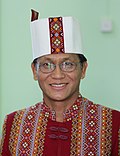| Vice Presidents of the Republic of the Union of Myanmar | |
|---|---|
| ပြည်ထောင်စုသမ္မတမြန်မာနိုင်ငံတော် ဒုတိယ သမ္မတ | |
 | |
Incumbents since 7 August 2025Vacant | |
| Style | His Excellency (formal) |
| Member of | Cabinet National Defence and Security Council |
| Residence | Presidential Palace |
| Seat | Naypyidaw |
| Nominator | Assembly of the Union |
| Appointer | Presidential Electoral College |
| Term length | Five years, renewable once |
| Constituting instrument | Constitution of Myanmar |
| First holder | Tin Aung Myint Oo Sai Mauk Kham |
| Salary | K4 million / month [1] |
 |
|---|
The vice presidents of Myanmar (also known as Burma) are the second highest-ranking posts in the government of the Republic of the Union of Myanmar. [2] The offices were established by the 2008 Myanmar constitution and rank directly below the president. The offices came into effect on 30 March 2011, when the new government assumed de jure power and essentially function in the same manner as any other deputy head of state. There are two vice-presidential posts in the government, [3] but no distinction is officially made between them. It can be assumed that the posts follow the order of seniority, much like the ones practised by the Vice Premier of the People's Republic of China.




